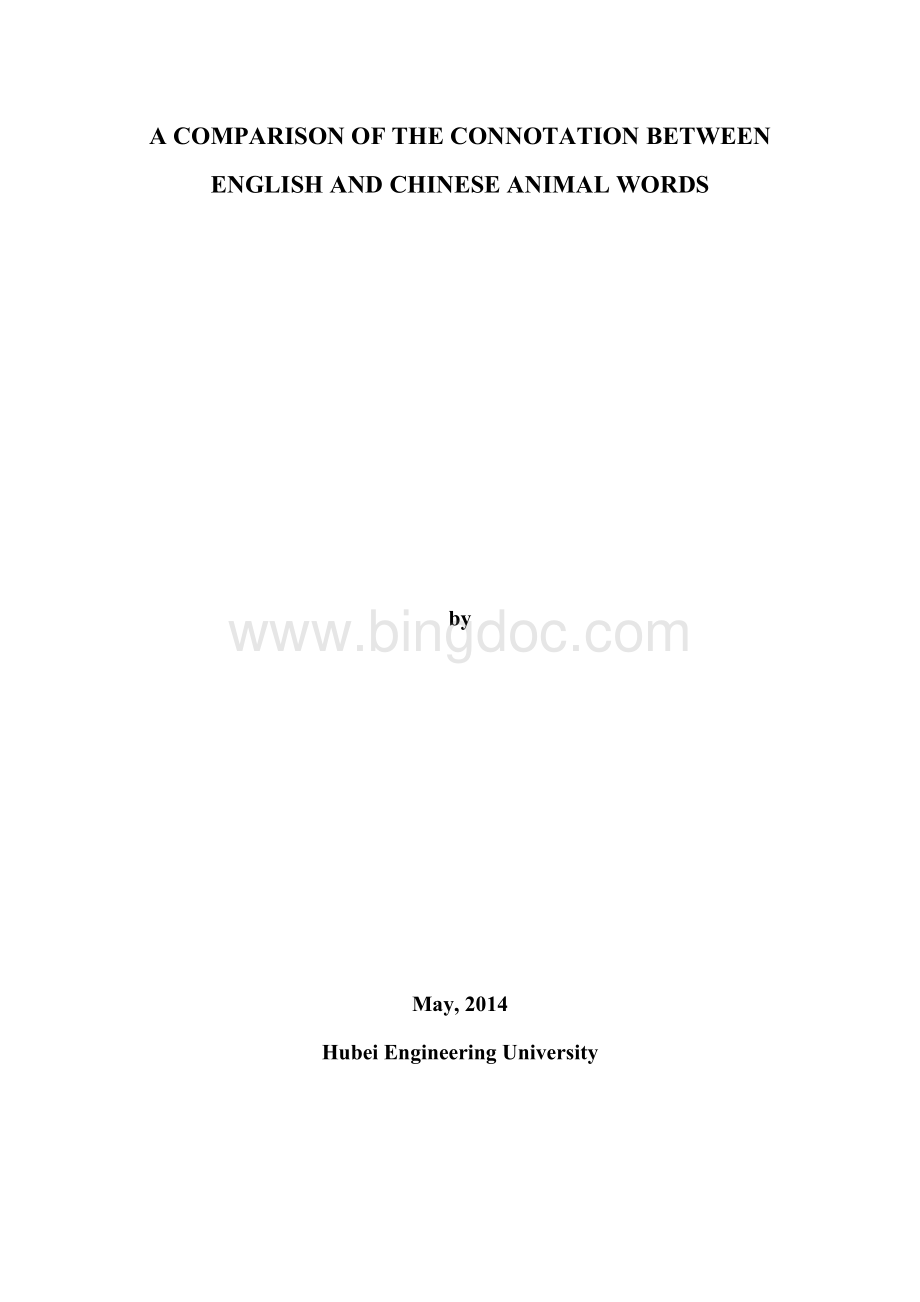英汉动物词汇的文化内涵对比论文终稿.doc
《英汉动物词汇的文化内涵对比论文终稿.doc》由会员分享,可在线阅读,更多相关《英汉动物词汇的文化内涵对比论文终稿.doc(20页珍藏版)》请在冰点文库上搜索。

ACOMPARISONOFTHECONNOTATIONBETWEENENGLISHANDCHINESEANIMALWORDS
by
May,2014
HubeiEngineeringUniversity
Abstract
BothEnglishcultureandChineseculturehavealargenumberofwordsrelatedwithanimals.ThesameanimalwordsmayhavethesameordifferentconnotationsinEnglishandChinese,anddifferentanimalwordsmayhavesimilarconnotationsinEnglishandChinese.Inaddition,animalwordshavesemanticgapsinEnglishandChinese.ThispaperisintendedtocontrastandanalyzetheconnotationbetweenEnglishandChineseanimalwordsfromtheseaspectsanddiscussthecausesofdiscrepancyintheconnotationbetweenEnglishandChineseanimalwordsformtheanglesofreligion,history,geographicalenvironmentandaestheticorientation.Moreover,thispaperanalyzestheinfluencesoftheconnotationofanimalwordsoninterculturalcommunication.Thenthispapergivessomesuggestionsforinterculturalcommunication.Atlast,itdrawsaconclusionthatlanguageisthecarrierofculture.Languagesofdifferentnationspresentrichculturalproperties.WeshouldpaymoreattentiontothediscrepancyintheconnotationbetweenEnglishandChineseanimalwordsduringtheprocessofinterculturalcommunicationandenrichourknowledgeofdifferentculturesasmuchaspossible.Intheageofglobalization,communicationbetweentheChinesecultureandtheEnglishcultureisontheincreasedaybyday.Withthehelpofthispaper,peoplecanunderstandtheculturaldifferenceofEnglishandChineseanimalwordsfurtherandachieveperfectinterculturalcommunication.
Keywords:
Animalwords;EnglishandChinese;Connotations;Comparison
英汉动物词汇的文化内涵对比
摘要
在英汉两种文化中有许许多多与动物相关的词汇。
同一动物词汇在英汉语言中可能具有相同或者不同的文化内涵,不同的动物词汇在英汉语言中可能会有相似的文化内涵。
另外,动物词汇在英汉语言中存在语义空缺现象。
本文旨在从这几个方面对比和分析英汉动物的文化内涵,并从宗教、历史、地理环境、审美取向的角度探讨英汉动物词汇的文化内涵存在差异的原因。
此外,本文分析了动物词汇的文化内涵对跨文化交流的影响。
然后,本文为跨文化交流提出了一些建议。
最后,得出结论:
语言是文化的载体,不同民族的语言呈现出丰富多彩的文化特性。
在跨文化交流过程中,我们应该更加重视英汉动物词汇的文化内涵差异,尽可能丰富我们在不同文化领域的知识。
在全球化的时代,中西文化交流日益频繁。
通过本文,人们能够进一步了解英汉动物词汇的文化差异,顺利进行跨文化交流。
关键字:
动物词汇;英语和汉语;文化内涵;对比
Contents
1.Introduction 1
2.ConnotationsofEnglishandChineseAnimalWords 1
2.1ConnotationofanimalwordsinChineseandEnglish 1
2.1.1Animalwordswiththesameconnotations 2
2.1.2Animalwordswithdifferentconnotations 3
2.1.3Animalwordswithsimilarconnotations 6
2.2Semanticgaps 7
2.2.1AnimalwordswithrichconnotationsinChinese 7
2.2.2AnimalwordswithrichconnotationsinEnglish 8
3.TheCausesofDiscrepancyintheConnotationbetweenEnglishandChineseAnimalWords 9
3.1Religion 10
3.2History 10
3.3Geographicalenvironment 11
3.4Aestheticorientation 11
4.InfluencesoftheConnotationofAnimalWordsonInterculturalCommunication 12
5.SuggestionsforInterculturalCommunication 13
6.Conclusion 14
Bibliography 16
AComparisonoftheConnotationbetweenEnglishandChineseAnimalWords
1.Introduction
Theintimaterelationshipwithanimalsmakeshumanbeingshavecomplexemotions,suchasfondness,sympathy,disgustandhorror,etc.Humansoftenplacetheirfeelingsonanimalsanduseanimalstoexpressfeelingsaswell.ManyanimalwordsandphrasesareendowedwithconnotationsinEnglishandChinese.Therefore,learningaboutthedifferentconnotationsofEnglishandChineseanimalwordscanhelpEnglishlearnerstocorrectlyunderstandthislanguage.Animalwordshavethesame,differentorsimilarconnotationsinEnglishandChinese.Inmostcases,althoughbothEnglishandChinesehavethesamereferentialmeaningsofanimalwords,theconnotationsoftheseanimalwordsaredifferent(ShangQi,2006).Thisiscausedbyreligion,history,geographicalenvironmentandaestheticorientation.ThispaperstartswiththecomparisonofEnglishandChineseanimalwords.Afterwards,thispaperdiscussesthecausesofdiscrepancyinconnotationsbetweenEnglishandChineseanimalwords.Intheend,thispaperdiscussestheinfluencesofculturalconnotationsofanimalwordsoninterculturalcommunication.
2.ConnotationsofEnglishandChineseAnimalWords
2.1ConnotationofanimalwordsinChineseandEnglish
ThesameanimalwordsmayhavethesameordifferentculturalconnotationsinEnglishandChinese.Inaddition,differentanimalwordsmayhavesimilarculturalconnotationsinEnglishandChinese.
2.1.1Animalwordswiththesameconnotations
Livinginasimilarecologicalenvironment,peoplemayhaveasameimaginationaboutanimals.Therefore,animalwordswillbeendowedwiththesameculturalconnotation.InChineseandinEnglish,thefoxiscunning;theassisstupid;thelambisdocile;thewolfisalwayshungry;therabbitcanrunrapidly;thebeeisbusy;thesnakeiscrafty;thehenisassociatedwithwoman.Forexample,whenwesay“heisafox”,ChinesepeopleandNativeEnglishspeakerswillrealizethatheiscunning.TothenativeEnglishspeakersandChinesepeople,“pig”standsfordirtiness,lazinessandstupidity.Therefore,therearesomesayingslike“asfatasapig”,“eatlikeapig”,“makeapigofoneself”,etc.InChinesecultureandEnglishculture,“bee”alwaysgivesustheimpressionofanextremelyhardworker.Wecanuse“asbusyasabee”todescribesomeonewhoisdiligent.A“parrot”(atypeoftropicalbirdwithhookedbeakandbrightlycoloredfeathers)canbetrainedtoimitatehumanvoice.InChinesecultureandEnglishculture,itisusedtodescribesomeonewhorepeatsthewordsoractionsofotherswithoutunderstandingthemeaning.InChinesecultureandEnglishculture,“ass”isalwaysusedtodescribeastupidperson.Thesaying“makeanassofassofoneself”meansthatonebehavesstupidlyandridiculously.InChinesecultureandEnglishculture,“dove”isasymbolofpeace.TothenativeEnglishspeakerandChinesepeople,“sheep”isonekindofdocileanimal.Whenitcomestothesheep,peoplewillhaveagentleandmeekimageinmind.Therefore,“sheep”isalwaysusedtodescribeagentleandmeekcharacter.
2.1.2Animalwordswithdifferentconnotations
InChinesecultureandEnglishculture,differentculturalbackgroundscanresultindifferentconnotations.
InChineseculture,“dragon”isakindofmythicanimalwhichhasscales,clawsandlegsandwhichcanflyinthesky,swimintheseaandcreatecloudandrain.“Dragon”issomethingsacredandisusedtorepresenttheancestorofChinesenation.ThisiswhytheChinesepeoplecallthemselvesdescendantsofdragon.InancientChina,“dragon”wasasymbolofimperialpower.Ancientemperorscalledthemselvesas“真龙天子”(thesonofdragon).Theirclotheswereembroideredwithdragonandwerecalledas“龙袍”(dragonrobe);theirchairswerecalledas“龙椅”(dragonthrone);theirposteritieswerecalledas“龙种”(dragonchildren).InChina,wemayoftenhearthatChineseparentsexpecttheirsonbecomea“dragon”(expectone’schildcanhaveabrightfuture)(LuoAifeng,2006).However,theliberaltranslationsoundsridiculoustonativeEnglishspeakers,becausetheythinkdragonisanevilmonsterwhichcanspitfireandhasthreetonineheads.InEnglishculture,“dragon”isalwaysusedtodescribefiercenessespeciallyforwomen.Forexample,“sheisadragon,you’dbetterkeepawayfromher”(sheisabad-temperedperson).
ChinesenationandEnglishnationshareasamehabitofraisingdogs.InChineseculture,“dog”isaderogatoryanimalwordandisendowedwithuglythings.Forexample,“actlikeasnob”(狗眼看人低),“mistakeagoodmanforabadone”(狗咬吕洞宾,不识好人心),“afilthymouthcannotutterdecentlanguage”(狗嘴里吐不出象牙).However,“dog”symbolizesfriendship,sincerityandloyaltyinEnglishculture.Forexample,“loveme,lovemydog”,“everydoghashisday”(everypersonwillsomedaysucceedofbecomefortunate),“toletsleepingdoglie”(tomakenotroubleornottodisturbpeople),“aluckydog”(aluckyman),“ajollydog”(ahappyperson),“acleverdog”(acleverman),“atopdog”(apersonhasadvantagesindoingsomethings),“nothaveadog’schance”(havenochance),“agooddogdeservesagoodbone”(amanwhomakesacontributionshouldberewarded)and“likeadogwithtwotails”(veryhappy).
InChineseculture,owl,theanimalwhichalwaysshoutsandcriesatnight,isconsideredtobeananimalwhichwillbringunluckinessandmisfortune.InEnglishculture,“owl”isregardedasthesymbolofwisdom.Ifonesaysyouareowlish,itmeansthatyouarecleverandstrict.“Aswiseasanowl”indicatesthatthenativeEnglishspeakersassociatewisdomwithowl.Anotherexamplecanbeprovided,“hepeeredowlishlyatusthroughhisglasses”.
InChinesetraditionalculture,“bat”isasymbolofhappiness,because“蝠”and“福”arehomonyms.Andredbatisasignofluckiness,because“红蝠”and“洪福”arealsohomonyms.Insomecases,Chinesepeoplecombine“bat”and“deer”togetherinordertoget“蝠鹿”,whichhasthesamepronunciationwith“福禄”.Anditmeanshappinessandgoodfortune(蒋磊,2000).However,theWesternersareafraidofbat.Theydislikebat,becauseitisoftenrelatedwithuglyandevilimage.Therefore,Englishidiomsaboutbatarealwaysderogatory,forexample,“asblindasabat”(haveeyesbutseenothing);“crazyasabat”(abnormal).
“Peacock”isamalebirdwithlongblueandgreentailfeathers,whicharelikeafanwhenthetailfeathersarespreadout.However,astheaestheticorientationsofChinesecultureandEnglishculturearedifferent,“peacock”representsdifferentimagesandhasatotallydifferentculturalconnotation.NativeEnglishspeakersholdthatthepeacockisproudandvainwhenitiswalkingwithtailfeathersspreadout.Therefore,itgivesthemtheimpressionofvanityandarrogance.Suchas“asproudasapeacock”,“playthepeacock”